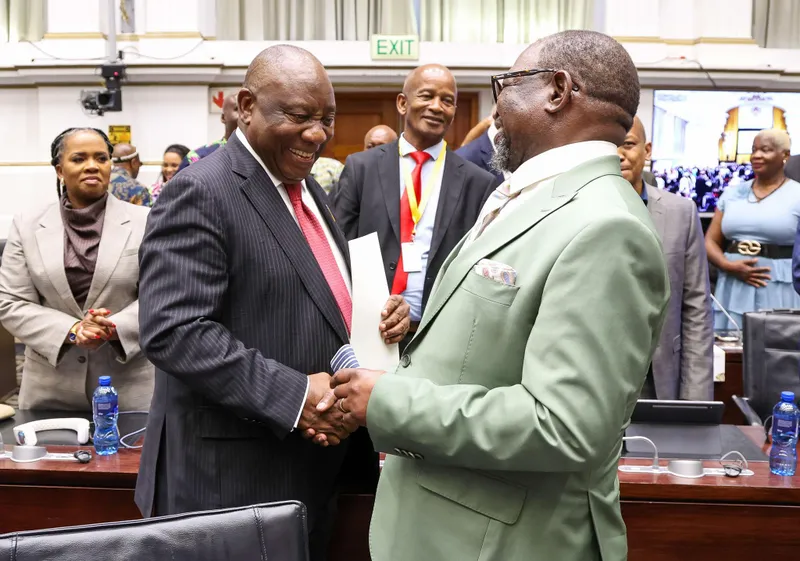Jesse Jackson Helped Create the America Trump Wants to Destroy
This article explores the profound impact of Jesse Jackson on American politics and society, highlighting his role in advocating for minorities and shaping the political ...
Ramaphosa Silent On Holding The Political Elite Accountable
President Cyril Ramaphosa's recent State of the Nation Address raises questions about the effectiveness of targeting municipal officials in the fight against corruption. ...
Godongwana's Moment of Reckoning In Reversing Economic Fragility
Enoch Godongwana's upcoming 2026 Budget Speech is set against a backdrop of economic fragility and opportunity. This article explores the key challenges facing South ...
AU Leaders' Summit: Translating Lofty Promises Into Action
The 39th African Union Summit highlighted the critical issues of water scarcity and sanitation in Africa, yet failed to deliver concrete solutions or binding commitments, ...
Jesse Jackson's Enduring Legacy in the Fight for Justice and Freedom
Rev. Jesse Jackson's legacy transcends borders, as he championed civil rights in the United States and fought against apartheid in South Africa, reminding us of ...
Understanding the US Blockade: Cuba's Struggle for Sovereignty
The article explores the severe implications of the US blockade on Cuba, highlighting the humanitarian crisis resulting from economic sanctions and the geopolitical ...
Mbeki, Zuma Resistance Undermining the Struggle for Truth and Justice
The Khampepe Commission represents a pivotal moment in South Africa's democratic journey, challenging the silence of former presidents Mbeki and Zuma. This article ...
China's Zero-Tariff Policy: A Game Changer for Africa's Trade
China's commitment to zero tariffs on African exports is reshaping trade relations and fostering shared prosperity between China and Africa, says Prof. David Monyae. ...
SONA 2026: The Need for Radical Change in SA's Economic Trajectory
Dr Thanti Mthanti critiques President Ramaphosa's latest State of the Nation Address, arguing that South Africa requires a radical economic transformation to address ...
Rethinking Criminal Justice Reform: Moving Beyond Force
Amidst a backdrop of rising crime and systemic corruption, this article examines the South African government's response to safety concerns, questioning the effectiveness ...
Kenya, China Landmark Trade Deal A Boost For Economic Growth
Kenya and China have signed a preliminary trade agreement granting zero-duty access for 98.2% of goods exported from Kenya, aiming to boost agricultural exports ...
Surrender Is Not An Option For The Cuban People
Claims by officials in Washington that “Cuba’s collapse is imminent” usually coincide with a tightening of the blockade. Yet, once again, Cubans have reaffirmed ...
Curbing SONA Opulence Amid Poverty, Unemployment Crises
SONA and SOPAs should be used to set the government’s agenda, not to demonstrate unnecessary opulence and extravagance, says the writer.
A Political Intervention To Restore The State's Institutional Credibility
President Cyril Ramaphosa's SONA was an attempt to project authority, continuity, and resolve at a moment when both citizens and markets remain uncertain about the ...
Navigating sovereignty: Africa's role in the US, China Rivalry
Africa stands at a crossroads as the U. S. and China vie for influence on the continent. This article explores how Africa can leverage its mineral wealth and strategic ...
SONA 2026: Ramaphosa's Message Of Hope Disconnected From Reality
Dr Reneva Fourie critically examines President Ramaphosa's recent State of the Nation Address, highlighting the gap between hopeful rhetoric and the reality of ongoing ...
Empowering Local Government For Economic Inclusion In South Africa
Dr Reneva Fourie examines the pivotal role of local government in addressing economic inclusion and inequality in South Africa, arguing for a shift in focus towards ...
SONA 2026: Another Performance In The Long Politics Of Pretence?
SONA 2026 presents a pivotal moment for South Africa, as President Cyril Ramaphosa's address is set against a backdrop of political fragility and economic challenges. ...
BRICS and Africa: A New Era of Multilateral Partnerships for 2026
The BRICS bloc can play a pivotal role in addressing Africa's pressing challenges in water, sanitation, climate change, and economic integration by 2026, fostering ...
